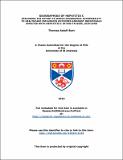Files in this item
Geographies of hepatitis C : exploring the extent to which geographic accessibility to healthcare influences outcomes amongst individuals infected with Hepatitis C in NHS Tayside, Scotland
Item metadata
| dc.contributor.advisor | Flowerdew, Robin | |
| dc.contributor.advisor | Boyle, P. J. | |
| dc.contributor.advisor | Dillon, John | en_US |
| dc.contributor.author | Astell-Burt, Thomas | |
| dc.coverage.spatial | 410 | en_US |
| dc.date.accessioned | 2011-12-23T12:48:54Z | |
| dc.date.available | 2011-12-23T12:48:54Z | |
| dc.date.issued | 2010-06 | |
| dc.identifier.uri | https://hdl.handle.net/10023/2135 | |
| dc.description.abstract | Millions of people are infected with the Hepatitis C Virus (HCV) worldwide. In the UK, many individuals continue to live with undiagnosed HCV infection and are increasingly at risk of developing life-threatening cirrhosis and liver cancer. Of those that are diagnosed, only some are referred to an HCV specialist centre where vital treatment could cure their infection. Of those that are referred, only a proportion have actually attended and stayed in follow-up with a specialist centre. Geographic access to healthcare may be an important factor in these trends, but has so far received little attention in the context of HCV. This thesis examines the influence of geographic access to primary and specialist healthcare on HCV detection, trends of referral, chances of specialist centre utilisation and the odds of staying in follow-up. It also explores association between geographic access and the type of location in which diagnoses were made with the risk of mortality from liver-related causes. HCV detection was lower amongst those with poorer geographic access to primary healthcare, but further analyses suggest this trend is due to selection, not causation. Individuals with the furthest to travel were less likely to be referred to an HCV specialist centre, compared to those who lived closer. Travel-time was not a significant predictor of utilisation of HCV specialist centres, but with patients in more remote areas less likely to be referred, it is probable that the utilisation result is biased due to selection. Liver-related mortality was higher for patients diagnosed in hospitals, but the risk of death was not associated with a lack of geographic access to healthcare. | en_US |
| dc.language.iso | en | en_US |
| dc.publisher | University of St Andrews | |
| dc.subject.lcc | RC848.H425A8 | |
| dc.subject.lcsh | Hepatitis C--Treatment--Scotland--Tayside | en_US |
| dc.subject.lcsh | Health services accessibility--Scotland--Tayside | en_US |
| dc.title | Geographies of hepatitis C : exploring the extent to which geographic accessibility to healthcare influences outcomes amongst individuals infected with Hepatitis C in NHS Tayside, Scotland | en_US |
| dc.type | Thesis | en_US |
| dc.type.qualificationlevel | Doctoral | en_US |
| dc.type.qualificationname | PhD Doctor of Philosophy | en_US |
| dc.publisher.institution | The University of St Andrews | en_US |
This item appears in the following Collection(s)
Items in the St Andrews Research Repository are protected by copyright, with all rights reserved, unless otherwise indicated.

